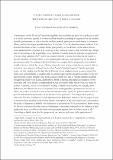Files in this item
The protection of the rich against the poor : the politics of Adam Smith's political economy
Item metadata
| dc.contributor.author | Harris, James A. | |
| dc.date.accessioned | 2019-07-03T14:30:06Z | |
| dc.date.available | 2019-07-03T14:30:06Z | |
| dc.date.issued | 2021-01-07 | |
| dc.identifier | 257767001 | |
| dc.identifier | 1e251b74-26bc-4b61-8361-cfdbe2a1a368 | |
| dc.identifier | 85099097800 | |
| dc.identifier | 000605612700008 | |
| dc.identifier.citation | Harris , J A 2021 , ' The protection of the rich against the poor : the politics of Adam Smith's political economy ' , Social Philosophy and Policy , vol. 37 , no. 1 , pp. 138-158 . https://doi.org/10.1017/S0265052520000084 | en |
| dc.identifier.issn | 0265-0525 | |
| dc.identifier.other | ORCID: /0000-0002-0333-3754/work/95041894 | |
| dc.identifier.uri | https://hdl.handle.net/10023/18035 | |
| dc.description.abstract | My point of departure in this essay is Smith’s definition of government. “Civil government,” he writes, “so far as it is instituted for the security of property, is in reality instituted for the defence of the rich against the poor, or of those who have some property against those who have none at all.” First I unpack Smith’s definition of government as the protection of the rich against the poor. I argue that, on Smith’s view, this is always part of what government is for. I then turn to the question of what, according to Smith, our governors can do to protect the wealth of the rich from the resentment of the poor. I consider, and reject, the idea that Smith might conceive of education as a means of alleviating the resentment of the poor at their poverty. I then describe how, in his lectures on jurisprudence, Smith refines and develops Hume’s taxonomy of the opinions upon which all government rests. The sense of allegiance to government, according to Smith, is shaped by instinctive deference to natural forms of authority as well as by rational, Whiggish considerations of utility. I argue that it is the principle of authority that provides the feelings of loyalty upon which government chiefly rests. It follows, I suggest, that to the extent that Smith looked to government to protect the property of the rich against the poor, and thereby to maintain the peace and stability of society at large, he cannot have sought to lessen the hold on ordinary people of natural sentiments of deference. In addition, I consider the implications of Smith’s theory of government for the question of his general attitude toward poverty. I argue against the view that Smith has recognizably “liberal,” progressive views of how the poor should be treated. Instead, I locate Smith in the political culture of the Whiggism of his day. | |
| dc.format.extent | 208724 | |
| dc.language.iso | eng | |
| dc.relation.ispartof | Social Philosophy and Policy | en |
| dc.subject | Smith | en |
| dc.subject | Hume | en |
| dc.subject | Whiggism | en |
| dc.subject | Poverty | en |
| dc.subject | Government | en |
| dc.subject | Allegiance | en |
| dc.subject | Utility | en |
| dc.subject | Authority | en |
| dc.subject | BJ Ethics | en |
| dc.subject | B Philosophy (General) | en |
| dc.subject | T-NDAS | en |
| dc.subject.lcc | BJ | en |
| dc.subject.lcc | B1 | en |
| dc.title | The protection of the rich against the poor : the politics of Adam Smith's political economy | en |
| dc.type | Journal article | en |
| dc.contributor.institution | University of St Andrews. Philosophy | en |
| dc.contributor.institution | University of St Andrews. Institute of Legal and Constitutional Research | en |
| dc.contributor.institution | University of St Andrews. Centre for Global Law and Governance | en |
| dc.identifier.doi | 10.1017/S0265052520000084 | |
| dc.description.status | Peer reviewed | en |
| dc.date.embargoedUntil | 2019-07-03 |
This item appears in the following Collection(s)
Items in the St Andrews Research Repository are protected by copyright, with all rights reserved, unless otherwise indicated.

